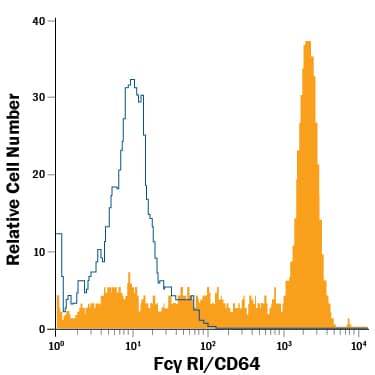Human Fc gamma RI/CD64 PE-conjugated Antibody
R&D Systems, part of Bio-Techne | Catalog # FAB12571P


Key Product Details
Species Reactivity
Validated:
Cited:
Applications
Validated:
Cited:
Label
Antibody Source
Product Specifications
Immunogen
Gln16-Pro288
Accession # P12314.2
Specificity
Clonality
Host
Isotype
Scientific Data Images for Human Fc gamma RI/CD64 PE-conjugated Antibody
Detection of Fc gamma RI/CD64 in Human Monocytes by Flow Cytometry.
Human peripheral blood monocytes were stained with Mouse Anti-Human Fc gamma RI/CD64 PE-conjugated Monoclonal Antibody (Catalog # FAB12571P, filled histogram) or isotype control antibody (Catalog # IC002P, open histogram). View our protocol for Staining Membrane-associated Proteins.Applications for Human Fc gamma RI/CD64 PE-conjugated Antibody
Flow Cytometry
Sample: Human peripheral blood monocytes
Formulation, Preparation, and Storage
Purification
Formulation
Shipping
Stability & Storage
Background: Fc gamma RI/CD64
Receptors for the Fc region of IgG (Fc gamma Rs) are members of the Ig superfamily that function in the activation or inhibition of immune responses such as degranulation, phagocytosis, ADCC (antibody-dependent cell-mediated cytotoxicity), cytokine release, and B cell proliferation (1-3). The Fc gamma Rs have been divided into three classes based on close relationships in their extracellular domains; these groups are designated Fc gamma RI (also known as CD64), Fc gamma RII (CD32), and Fc gamma RIII (CD16). Each group may be encoded by multiple genes and exist in different isoforms depending on species and cell type. The CD64 proteins are high affinity receptors (~10‑8 - 10-9 M) capable of binding monomeric IgG, whereas the CD16 and CD32 proteins bind IgG with lower affinities (~10-6 - 10-7 M), only recognizing IgG aggregates surrounding multivalent antigens (1, 4). Fc gamma Rs that deliver an activating signal either have an intrinsic immunoreceptor tyrosine-based activation motif (ITAM) within their cytoplasmic domains, or associate with one of the ITAM-bearing adapter subunits, Fc R gamma or zeta (3, 5). The only inhibitory member in human and mouse, Fc gamma RIIb, has an intrinsic cytoplasmic immunoreceptor tyrosine-based inhibitory motif (ITIM). The coordinated functioning of activating and inhibitory receptors is necessary for successful initiation, amplification, and termination of immune responses (5).
Three highly homologous genes (A, B, and C) sharing 98% identity at the nucleotide level have been identified for the human CD64 group (1). Fc gamma RI is transmembrane protein with three extracellular Ig-like domains, and it delivers an activating signal via the associated Fc R gamma accessory chain. The genes for Fc gamma RIB and Fc gamma RIC contain stop codons within their membrane proximal Ig-like domains indicating possible secreted receptors (1, 6). An mRNA splice variant of Fc gamma RIB has a deletion of the membrane-proximal Ig-like domain and encodes a putative transmembrane receptor (6). The high affinity recognition of IgG by Fc gamma RI permits the triggering of effector responses at low IgG concentrations typical of early immune responses (2). Fc gamma RI is expressed constitutively on monocytes and macrophages and can be induced on neutrophils and eosinophils (1, 4). Its expression is up-regulated during bacterial infections and sepsis. Over amino acids 16-288, human CD64 shares 72% amino acid sequence identity with mouse CD64.
References
- Van de Winkel, J. and P. Capes (1993) Immunol. Today 14:215.
- Raghaven, M. and P. Bjorkman (1996) Annu. Rev. Cell Dev. Biol. 12:181.
- Ravetch, J. and S. Bolland (2001) Annu. Rev. Immunol. 19:275.
- Takai, T. (2002) Nat. Rev. Immunol. 2:580.
- Ravetch, J. and L. Lanier (2000) Science 290:84.
- Ernst, L. et al. (1998) Mol. Immunol. 35:943.
Long Name
Alternate Names
Gene Symbol
UniProt
Additional Fc gamma RI/CD64 Products
Product Documents for Human Fc gamma RI/CD64 PE-conjugated Antibody
Product Specific Notices for Human Fc gamma RI/CD64 PE-conjugated Antibody
For research use only